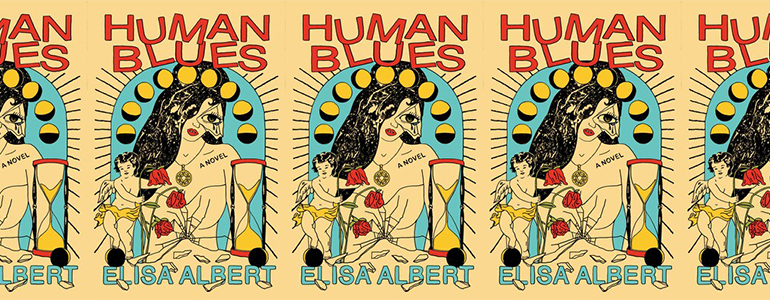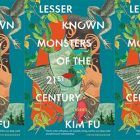Human Blues and Reproductive Self-Determination

Elisa Albert’s Human Blues, out last month, follows singer-songwriter Aviva Rosner as she copes with newfound fame upon the release of her fourth album, Womb Service, and, at the same time, struggles with infertility in her attempts to conceive a child without medical intervention. In the process, she reckons with cultural expectations for women, especially when it comes to expressions of anger and sexuality. While touring, Aviva is often alone with her phone, which she calls “the portal,” and she develops an obsession with Amy Winehouse, whom she looks to as a sort of patron saint of the unruly woman artist.
Told in nine chapters, which correspond with Aviva’s menstrual cycles, the novel foregrounds questions about the reproductive body in its exploration of agency, celebrity, and creativity. As Aviva sets out on her album tour with just her guitar for accompaniment, she calls herself a “wandering menstrual” and stops along the way to meet with various fertility specialists and wellness gurus, cycling all the while through hope and despair. Perhaps because of Albert’s work as a doula, the novel’s representation of infertility is profound, offering a rare and detailed portrayal of how birthing bodies function and how often medicine fails them.
The novel is propelled by Aviva’s many inner conflicts—a term she borrows from her therapist, known affectionately as the Rabbi—but primarily by the inner conflict between her all-consuming desire for a baby and her utter disdain for the fertility industrial complex. Aviva’s maternal ambivalence plays out in her blistering lyrics, which interviewers often task her with defending—lyrics like, “rote procreation is how the devil uses us up in the service of eternal damnation.”
Even with the novel’s structural focus on Aviva’s body, its driving force is her distinctive voice. A music critic describes her sound like this: “If Tom Waits and Fiona Apple had a baby who grew up to be a prickly, menstruation-obsessed feminist, she might sound like the intensely confrontational Aviva, whose lyrics are not for the faint of heart.” Written in an intimate third-person point of view, the novel immerses readers in Aviva’s thoughts and feelings, which, much like her lyrics, are not for the faint of heart. A firehose of profanity-laden rants, acerbic wit, and tender profundity, Aviva’s voice is powerful and at times nearly overpowering.
One might expect that Aviva’s experiences with infertility would bond her to others facing the same, but she refuses to offer uncritical support. “Supporting each other does not mean being silent about systemic forces that threaten our basic well-being,” she tells a young podcaster. Instead, Aviva becomes surlier in her judgments of these systemic forces, more outspoken about the costs (financial, physical, and otherwise) of fertility treatments, and increasingly hostile, especially to the (many) parents of twins she encounters (she even writes a song called “Rich White Twins”). She notes that when it comes to infertility, the “through-line was money,” and laments the pressure she feels to pursue additional interventions simply because she is privileged enough to afford and access treatment.
In her critique of assisted reproductive technology, does Aviva speak with the crass recklessness of a provocateur or the hard-won wisdom of a conscientious objector? Often, it’s a bit of both. She objects to how much remains unknown about the reproductive system of people assigned female at birth, despite the many technologies for manipulating it. If the menstrual cycle is the “fifth vital sign,” Aviva is desperate to discover what her irregular cycles might reveal about her health, but fertility specialists seem interested only in doling out prescriptions for the newest pharmaceuticals. Aviva worries, too, about whether egg donors and surrogates are empowered or exploited, about matters of agency and informed consent, about the unquestioning compliance doctors seem to expect from her. And she philosophizes about the meaning of fertility treatment. “What did it mean to force ovulation? What did it mean to inject massive quantities of synthetic hormones?” She continues this line of questioning, asking, “Was everyone really comfortable living in a society that believes it has the right to buy and sell life itself? Did the biological reprogramming of female bodies in the service of reproduction at any cost mean nothing?”
Over the course of her album tour, much to the chagrin of her longtime manager, Aviva resists the bland but palatable sound bites a media-trained celebrity might recite in favor of authenticity. Aviva’s allegiance is to her body and to her art, not to her fans or her groupies, not to the multinational conglomerate that financed her latest album, and not even to her family, though she really tries when it comes to her kindhearted schoolteacher husband, Sam. And yet, Aviva’s unruliness only enhances her reputation as a feminist firebrand, winning her more fans who flock to her performances, buying merch and singing along, even as she infuriates others.
Albert, who says she sought to write a “maximalist anti-hero,” seems aware that nearly every time Aviva speaks she advances headlong into the so-called Mommy Wars. As one radio host cautions Aviva, “reproduction is quite the sacred cow. And here you are—wham—tipping with impunity.” Just when it seems Aviva’s critiques of assisted reproductive technology are about to spin out, Albert anticipates potential objections and counterpoints, which are raised by Aviva’s various interlocutors.
A rotating cast of characters—influencers, journalists, and radio personalities; Aviva’s therapist, yoga instructor, and voice coach; old friends from high school and music school; neighborhood moms, sisters-in-law, and her mother, Barb(ed wire); strangers on airplanes and in coffee shops—form a Greek chorus of sorts, all weighing in on Aviva’s reproductive quandaries. Despite the fact that these conversations often include problematic assumptions and invasive questions, they present opportunities for Aviva to consider other perspectives and clarify her positions but also, crucially—for example, in a moving exchange Aviva has with a queer friend whose children are born via surrogacy—to hear vital pushback. They also make Albert’s novel a dense, thought-provoking, and multi-faceted contribution to the discourse on bodily autonomy and reproductive choices.
There are moments, too, when the narrator endeavors to prevent possible misreadings of the novel’s feminism. It’s true that Aviva is passionate about body literacy and suspicious of god-like medical interventions, but she consistently speaks of reproduction using gender-neutral language. The novel signposts its contempt for both anti-choice ideology and “gender critical” feminism. In fact, in one of her ranting, inner monologues, Aviva viciously insults then condemns TERFs, in one of the novel’s only instances of all-caps shouting: “BURN IN THE LOWEST CIRCLE OF HELL.”
If Albert tips her own hand, the novel’s most autobiographical character may well be Kirsten Tabowski, a full-spectrum doula, now retired, whose business card Aviva finds on a co-op bulletin board. At least it seems likely that Albert would draw on her own work as a doula in shaping this character. Tabowski fields a phone call from Aviva and engages her in a long-winded discussion about the perils of the fertility industrial complex, calling it a “giant sinkhole of suffering for profit.” Despite having supported people through abortions and unmedicated labors and stillbirths, Tabowski says, “but all the shit I have ever seen, combined, doesn’t touch the suffering in those clinics, man. And I am concerned about all that suffering.”
In addition to the many conversations Aviva has with others, external voices also clamor for attention via her phone’s newsfeed. Throughout the novel, scrolling summaries of Aviva’s social media encounters punctuate the action. “Someone was angry about an injustice in the government…Someone famous had a milestone birthday…Someone’s twins were dolled up in dots…Someone’s plants were getting repotted.” These interruptions often include headlines about scientific studies, promotions from wellness coaches, and updates from friends at various points of their own reproductive journeys, and they all impact Aviva’s emotional state. An author’s note, which may or may not be facetious, insists that “all news-feed stories and celebrity quotes are real.”
During Aviva’s UK tour she makes a pilgrimage to Camden Town to visit Amy Winehouse’s mother. If Aviva feels a sisterhood with anyone in the novel, it’s with Winehouse, and the identification works on many levels, including their shared Jewish identity. Many of the novel’s themes coalesce in the tragic figure of Winehouse: there’s procreation and destruction, the body and the voice, sexuality and agency, celebrity and creativity. There’s also suffering and grief. Here, Albert’s fiction is inspired by real life fandom, having met with Winehouse’s mother in reality. In an interview, Albert describes the experience, saying, “She and her husband are totally OK to go have coffee with anyone they deem a true fan. It’s like the longest continuously running shiva where we all love and value and mourn the same person.”
As Aviva contemplates what to say to Winehouse’s mom, she reflects on the nature of celebrity: “Something about obsession, something about how identification with musicians and artists gives us a way of understanding ourselves and our experiences, shows us who we are, who we’re not, who we want to be…In short: save our lives.” This reflection is just one of the novel’s many instances of metacommentary. As Aviva processes her reactions to Amy, she also arrives at a better understanding of the public’s reactions to her. Simultaneously, Albert presents readers with the opportunity to process their own reactions to Aviva.
For all of Aviva’s contempt for Western medicine, she scores a coveted appointment with a much-heralded fertility specialist and even agrees to try a fertility drug. Still, she is, by contrast, much more enthusiastic about pursuing alternative treatment modalities, especially those involving microdosing or plant medicine. She optimizes her diet and tries seed cycling, visits a tarot reader and a witchy sex therapist, carries crystals and buys expensive supplements. Aviva bemoans that the wellness industry, too, is appropriative and always trying to sell her something. It is also, as she discovers when she is assaulted by a massage therapist on a destination yoga retreat, not without its own risks.
As pressure mounts for Aviva to continue fertility treatments her resistance grows, and it becomes clear that what Aviva wants most of all is to do what she wants to do, expectations be damned. In the end, Aviva tells her manager, “I’m just not gonna do anything I don’t feel like doing, like ever again. Until I die, more or less.” It’s a proclamation that paraphrases the book’s epigraph, a quote from blues legend John Lee Hooker: “I don’t do nothing I don’t want to do.” In her own way, Aviva comes to terms with the gifts and limitations of her individual body and with her relationship to desire, what she’s willing to do to get what she wants. The novel is a potent reminder that the body and the voice are inseparable, and that both demand autonomy.



